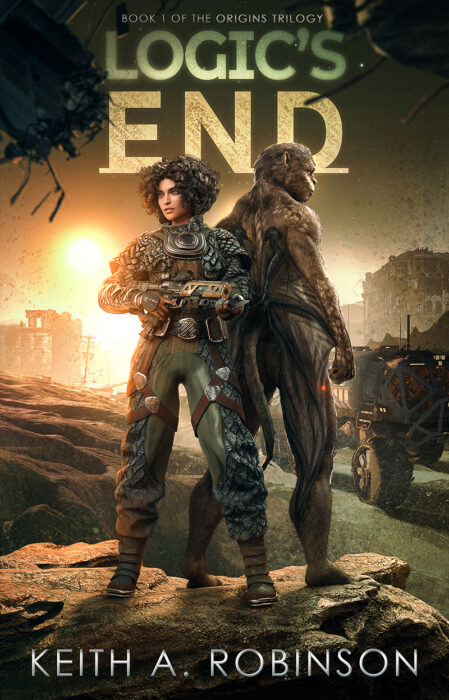Logic’s End
Have you ever tried to fathom the unfathomable number of stars and planets? Then guess what: life is rare. Thus, when NASA does discover another habitable planet, scientist Rebecca Evans is shaken by the possibilities. She had eagerly joined the mission of exploration. She was absolutely sure that any life on that planet—even a microbe—would settle the question of the origin of life on Earth. Now she will discover life, and it will settle the question of life’s origin.
But what happens next will be so different than she thinks.
In Logic’s End, Keith A. Robinson has fused two different projects.
First, this story shares the creation of a singular and comprehensive world, unlike our own world, and complete in itself. A range of species, each vividly different from the next, populates this grimly evocative world. Here, Robinson gives little concession to the old tendency to make aliens mirrors of ourselves. The aliens of his planet are intelligent beings with an essentially inhuman nature. Their physiology is almost monstrous, and their abilities are often novel. But it is their psychology that puts them at fundamental odds with humanity. From them radiates a sense of otherness.
Second, Logic’s End builds a world that evolved by the ruthless principle of the survival of the fittest, with no hand to guide it into grace. This novel enters unabashedly into the evolution versus creation debate, with plenty an argument. In order to make this case, Logic’s End mainly relies on showing. Its aliens, with all their sharp detail and studied cruelty, demonstrate the Darwinian ethos as the author believes it to be. Yet for all the book shows, the book is also not shy about telling. Didactic passages lightly, but undeniably, sprinkle the novel.
Taking the story on its own terms, Logic’s End argues strongly but not unassailably, even to a sympathetic reader.
For instance, one suspects that the evolutionist could make a good case for the survival value of love and compassion, or at least a better case than this novel admits. Various minor points can also be contested, such as the asexuality of the novel’s intelligent aliens. This is intriguing as an element of world-building, but unpersuasive as a line of argument. It is not clear that asexuality is, from an evolutionary viewpoint, either likely or advantageous. Asexual reproduction would, after all, cripple the diversification of DNA and the development of kinship bonds, both of which have obvious value for the survival of a species.
Logic’s End is based on an idea. To some extent, it is an argument for an idea. On both counts, it is open to challenge. But a book that leaves you thinking about the evolutionary value of love and the biological impact of asexuality has accomplished something.
Some readers will object to the novel’s didactic nature; others will object only to the specific opinions expressed. Yet the open promulgation of ideas is as classically sci-fi as the complex strangeness of the alien beings. Logic’s End is an intricate and weighty work of science fiction, overflowing with ideas and with the bleak visions of an alien world.
Best for: Adults, fans of science fiction.
Discern: Frequent violence, including battles and the murder of helpless beings; disturbing acts of cruelty, such as torture, mutilation, and the killing of injured comrades; sentient beings drink blood and engage in cannibalism.































Have you read Logic’s End ? Share your own review.